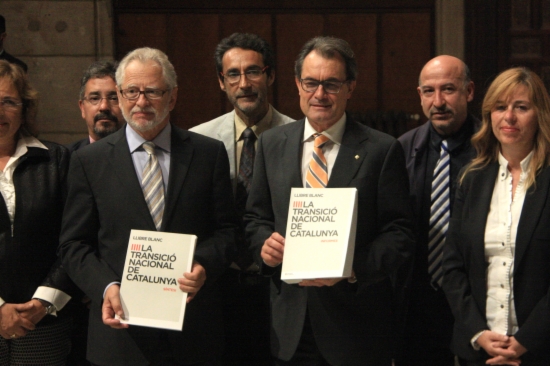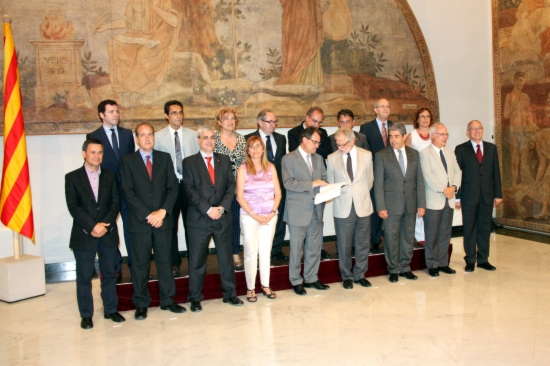30.09.2014 - 12:00
A White Paper on National Transition was presented last night at the Palau de la Generalitat, the seat of the Catalan government. At more than 1,400 pages, the volume provides documentation to help clarify, in an array of different fields, the steps Catalonia must take to become an independent state. The transition blueprint has been drafted by fifteen experts from the Advisory Council for National Transition (CATN) who have worked together for months on various key issues for the new state.
Can Catalonia become an independent state?
The answer is unequivocally, yes. The white paper provides an overview of the right to self-determination and its legal consequences throughout the world. According to the document, the right to self-determination is an indisputable and internationally recognized right; who has the right to exercise this right is the only matter that may potentially be debated. The white paper states, however, that the ruling from the International Court of Justice on Kosovo’s independence has opened an incontestable path with regard to Catalonia’s secessionist aspirations, which rests on two principal points:
On the one hand, the ICJ’s strong assertion that no rule of international law can be used to prevent an independence process anywhere in the world. On the other, the reaffirmation of the right of ‘last resort’, which means that independence can be understood and accepted as the last resort when, because of its status as a permanent minority, a national group within a democratic state can never be assured that regional agreements will be honoured by the majority. In this case, the text states, ‘the only possible remedy to this situation is changing the relations between the majority and the minority in order to put them on a footing of strict equality, granting the status of full sovereignty to the national minority’.
In this regard, the paper recommends arguing the case for Catalan self-determination as a matter of last resort in order to maintain self-government, yet without abandoning democratic principles and the principles binding Catalonia in a national community.
How will independence be declared?
The white paper recommends holding a popular consultation vote, the main tool to gage the political will of the Catalan people. After the consultation, and if the population votes for independence, a negotiating process with Spain and the European Union should begin.
If the event that Spain does not allow the consultation vote to proceed, the white paper proposes several alternative routes. One would be to hold an unofficial vote outside the
legal framework of the Catalan government, organized by civil society; a second would be to hold a plebiscite, possibility ‘the most appropriate option to determine the position of the Catalan people regarding its collective political future.
The report then discusses the option of declaring independence unilaterally, highlighting that doing so does not fit ‘the provisions of the existing constitutional order, even though from the perspective of international law and practice they are not illegal’.
Finally, the white paper considers the parliamentary procedure that should be followed in order to declare independence, which in its opinion would take the form of a legislative initiative that would then be signed into law.
Would an independent Catalonia be viable?
The white paper is very clear in this respect. It proposes an array of new institutions and responsibilities that must be assumed, which have until now been the responsibility of the Spanish government, but it does not envision this posing any significant problems. All of the analyses put forth in the document are based on two possible scenarios: a scenario of collaboration with Spain, and one of non-collaboration with Spain.
From these points of departure, the document analyses the future adaptation of the institutional system through the constitutional process and discusses what arrangements should be applied during the transition from being an autonomous community to being an independent state.
From an economic standpoint, the study is particularly compelling, as it calculates the quantitative variation of the Catalan government’s budget after independence. Based on the 2011 budget, the document states that, ‘if it had had the same revenue structure, tax system and tax burden as Spain for that year’, the Catalan government would have had extra income of 45.317 billion euros.
After taking into account all of the expenses that forming a new Catalan state would entail, such as establishing diplomatic missions, the white paper’s analysis concludes that the Catalan government would have annual gains of 11.59 billion euros. For comparison, it recalls that all the budget cuts the Catalan government has implemented over the last five years amount to six billion euros. Therefore, in a single year, the Catalan government would nearly double the amount it has been forced to cut from its budget. The white paper stresses that this would have a significant positive impact on both the economy as a whole and on the social benefits extended by the government.
What relationship will Catalonia have with Spain and Europe after independence?
The white paper proposes that, once Spain recognizes Catalonia’s independence, the Catalan government raise the possibility of establishing an Iberian Council comprising Catalonia, Andorra, Spain and Portugal. Following the model of the Nordic Council, the council would be a coordinating body between the parliaments and governments of the four states. Working within the European framework, it would serve to harmonize those policies that it would make sense to address jointly owing to the common geographical, cultural or social characteristics of the Iberian context. If Portugal and Andorra decline to join, Catalonia should then offer Spain the possibility of creating a Catalan-Spanish Council to handle issues of common interest, the white paper states. The paper also advocates that the Catalan state should foster relations with other Catalan-speaking territories and proposes the creation of a ‘language league’ following the model of the Dutch Language Union.
Regarding Catalonia’s relationship with the European Union, the white paper identifies four possible scenarios, but its assessment is that, given ‘the flexibility and pragmatism it has always shown’, when the time comes, the EU will opt to keep the new state in the Union or to create a special procedure to expedite its accession.
The white paper also openly discusses the possibility that Catalonia may choose to join the European Free Trade Association, the European Economic Area and the Schengen Agreement, and analyses in detail how this could be done.
How will Catalonia conduct international affairs?
The White Paper on National Transitional states that the integration of an independent Catalan state within the international community will be determined by the way in which the independence process takes place. If it unfolds with Spain’s consent, there will be no problem, whereas if it is unilateral, the path ahead will be longer.
In the latter case, the priority, according to the paper, would be to secure entry into the Council of Europe and the Partnership for Peace. More controversial decisions, such as a potential NATO membership, would have to be resolved in due course either by the Catalan Parliament or through a referendum, according to the document.
Regarding UN accession, the paper states that, once the conditions for admission are met, a request to join will suffice, and UN membership would not be an immediate priority in the event that Spain continues to oppose Catalonia’s independence. Nevertheless, the document identifies various UN institutions that would be likely to accept Catalonia’s participation while it is not yet a full UN member.




